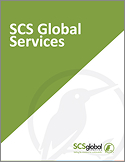
- Home /
- Services /
- Sustainable Agriculture /
- ProTerra Certification

EBC Business Group
Sustainably Produced, Fully Traceable, Non-GMO Ingredients
ProTerra certification ensures that high quality supplies of crops, food, and feed, which are independently certified as Non-GMO and produced to the highest sustainability standards, are available in the global marketplace.
Organizations become ProTerra certified by demonstrating adherence to ten principles that focus broadly on environment and natural resources, including: worker rights and community relations, climate change, good agricultural practices, prohibition on Genetically Modified Organisms (Non-GMO), along with traceability across the supply chain. There are three levels of certification, depending on the type of organization and the type of product to be certified.
Three levels of ProTerra certification:
- Level I: Agricultural production - the growth of crops and seeds. The unit of certification includes the entire farm, including non-cultivated areas, and all activities ongoing on site at the time of certification.
- Level II: Transport, Storage, Traders and Dealers – organizations that act only as chain of custody economic operators which will be audited against ProTerra’s Non-GMO and Traceability/Chain of Custody principles.
- Level III: Industrial Processing - any operation that transforms the agricultural production output, such as a crushing plant or a food product manufacturer.
Sectors impacted by ProTerra certification include agriculture, floriculture and horticulture, manufactured products, retail and service Industries. Certification can apply to a wide variety of agricultural commodities including bananas, fresh coconut, flowers and plants, sugarcane, corn/maize, rice, sunflower, rapeseed, fruits, nuts, palm oil, soy, spices, tea, and vegetables, as well as service sectors including catering, cereals, food and beverage, transport, wholesale and retail trade.
Why Choose SCS?
For the last four decades, SCS Global Services has been a leading Certification Body (CB) focusing on globally recognized sustainability certification in a wide variety of industries including sustainable agriculture, climate, biofuels, food safety and food labeling claims and sustainable forestry. SCS has been a pioneer in developing many of these certifications and offers more than 100 certification programs. As such, SCS is uniquely positioned to offer companies ProTerra certification along with the opportunity to bundle that certification with many of the other programs we currently offer, including Bonsucro, ISCC Plus and ISCC EU, RSPO, and an entire line of Food Safety and Food Labeling claims. Our global auditors are cross trained to provide you with exceptional service and significant cost savings.
- Benefits
- ProTerra Principles
- Process
- Documents
- ProTerra certification provides greater opportunities for companies to participate in the global marketplace that continues to increase its demand for sustainable and Non-GMO commodities
- As a highly recognizable sustainability certification, ProTerra gives producers and participant companies a competitive advantage in the global market by demonstrating their commitment to sustainability best practices.
- Certification can be bundled with other globally recognized sustainability certifications offered by SCS including Bonsucro, ISCC Plus, RSB and RSPO.
- Certification increases corporate credibility by showcasing that companies are contributing to a more environmentally sustainable and responsible economy.
The ProTerra Certification Standard is organized in principles, criteria and indicators that factor into the three levels of certification. ProTerra’s ten principles are listed below:
PRINCIPLE 1
Compliance with law, international conventions and the ProTerra Standard
PRINCIPLE 2
Human rights and responsible labour policies and practices
PRINCIPLE 3
Responsible relations with workers and community
PRINCIPLE 4
Biodiversity conservation, effective environmental management and environmental services
PRINCIPLE 5
No use of Genetically Modified Organisms (GMOs)
PRINCIPLE 6
Pollution and waste management
PRINCIPLE 7
Water Management
PRINCIPLE 8
Greenhouse gases and energy management
PRINCIPLE 9
Adoption of good agricultural practices
PRINCIPLE 10
Traceability and Chain of Custody
Steps to Certification
- Scoping and Project Initiation
- Client submits application and requests a quote for ProTerra certification services
- SCS confirms the project scope and provides a proposal for ProTerra services
- Client signs Work Order and returns to SCS to begin the ProTerra certification process
- On-Site Audit
- Client provides SCS documentation for review prior to the on-site audit
- SCS auditor conducts an audit of client operations
- SCS provides client with a report on compliance to ProTerra standard requirements
- 3. Corrective Actions
- Client responds to any necessary corrective actions
- SCS reviews the audit report and corrective action documentation
- 4. Final Certification Decision
- SCS head office makes a certification determination and informs The ProTerra Foundation if approved
- Upon successful ProTerra certification, client is issued a certificate and listed on the ProTerra website
- SCS can also provide client marketing support
| Document Name | Document |
|---|---|
| ProTerra Certification Standard V 5.0 | Visit Site |
Request Information
Ready to get started or need more info? Connect with us.
EBC Business Group
Service Brochure

Related Resources
-
Infographic
RESONATE - Part 2




